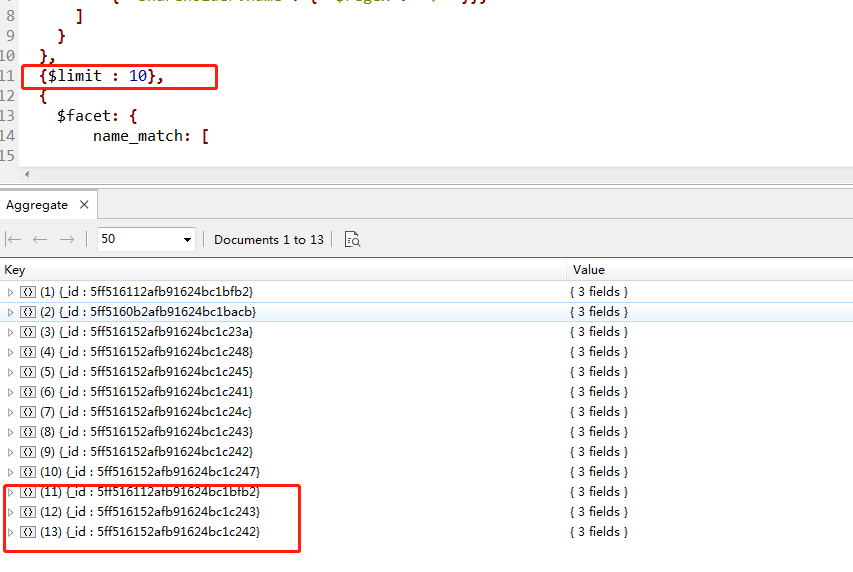Thank you for first.
MongoDB Version:4.2.11
I have a piece of data like this:
{
"name":...,
...
"administration" : [
{"name":...,"job":...},
{"name":...,"job":...}
],
"shareholder" : [
{"name":...,"proportion":...},
{"name":...,"proportion":...},
]
}
I want to match some specified data through regular expressions: For a example:
db.collection.aggregate([
{"$match" :
{
"$or" :
[
{"name" : {"$regex": "Keyword"}}
{"administration.name": {"$regex": "Keyword"}},
{"shareholder.name": {"$regex": "Keyword"}},
]
}
},
])
I want to set a flag when the $or operator successfully matches any condition, which is represented by a custom field, for example: {"name" : {"$regex": "Keyword"}} Execute on success:
{"$project" :
{
"_id":false,
"name" : true,
"__regex_type__" : "name"
}
},
{"administration.name" : {"$regex": "Keyword"}} Execute on success: "__regex_type__" : "administration.name"
I try do this:
{"$project" :
{
"_id":false,
"name" : true,
"__regex_type__" :
{
"$switch":
{
"branches":
[
{"case": {"$regexMatch":{"input":"$name","regex": "Keyword"}},"then" : "name"},
{"case": {"$regexMatch":{"input":"$administration.name","regex": "Keyword"}},"then" : "administration.name"},
{"case": {"$regexMatch":{"input":"$shareholder.name","regex": "Keyword"}},"then" : "shareholder.name"},
],
"default" : "Other matches"
}
}
}
},
But $regexMatch cannot match the array,I tried to use $unwind again, but returned the number of many array members, which did not meet my starting point.
I want to implement the same function as mysql this SQL statement in mongodb, like this:
SELECT name,administration.name,shareholder.name,(
CASE
WHEN name REGEXP("Keyword") THEN "name"
WHEN administration.name REGEXP("Keyword") THEN "administration.name"
WHEN shareholder.name REGEXP("Keyword") THEN "shareholder.name"
END
)AS __regex_type__ FROM db.mytable WHERE
name REGEXP("Keyword") OR
shareholder.name REGEXP("Keyword") OR
administration.name REGEXP("Keyword");
what should I do? Confused me for a long time.
Maybe this method is stupid, but I don’t have a better solution.
If you have a better solution, I would appreciate it!!! Thank you!!!



